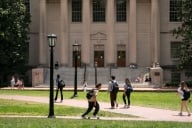You have /5 articles left.
Sign up for a free account or log in.
Senate Republicans in their opening bid for negotiations with Democrats over the next coronavirus aid package proposed giving colleges and universities an additional $29 billion in aid, which is a figure American Federation of Teachers president Randi Weingarten called “woefully inadequate.”
Colleges also could get part of another $5 billion for governors, who could also use the money on early childhood and K-12 education, “based on the needs of the state.” Unlike the last relief package, the CARES Act, institutions would not be required to give half their aid to students through emergency grants.
However, the proposal also cuts in half the amount of aid that can be received by institutions that had to pay a federal tax on endowments in 2019, and only allows them to spend the money on aid to students. That provision comes after Education Secretary Betsy DeVos criticized universities with large endowments for taking CARES Act aid.
The $29 billion falls about $17 billion short of the $46.6 billion institutions had been asking for to ease the financial hit they have taken during the recession. The figure does not include the $74 billion the American Council on Education (ACE), a group of presidents representing colleges and universities, had estimated would be the price tag for institutions to safely reopen campuses.
Senate Democrats, on the other hand, have proposed $132 billion for higher education.
Associations representing colleges said in statements Monday night they appreciated that the proposal included help for institutions, but it wasn’t enough.
“Unfortunately, the amount of higher education aid contained in this legislation is inadequate to address the extensive needs of the millions of students and families struggling to cope with lost jobs or reduced wages and colleges and universities reeling from lost revenues and increased costs,” said Ted Mitchell, ACE's president.
“We appreciate critical support for higher education in the Senate Republican package, but a lot more must be done as the legislative process moves forward,” said Peter McPherson, president of the Association of Public and Land-grant Universities.
Senator Lamar Alexander, the Republican chairman of the Senate education committee, acknowledged the proposal would likely change during negotiations with Democrats as Congress races to come to an agreement on a package by the end of the week.
“Now is the time for Democrats and Republicans to work together to get a result for the American people,” Alexander said in a statement
As expected, the Republican proposal also called for making it more difficult for people who are infected by the coronavirus to sue schools and other institutions, a proposal Democrats and Weingarten’s union oppose.
The proposal also included Alexander’s bid to require student loan borrowers who have some income to resume making payments on their loans.
All borrowers had been excused from making payments through Sept. 30 under the CARES Act. While Democrats have proposed giving borrowers a break on making payments for another year, Alexander’s proposal would require those with an income to pay at least 10 percent of their discretionary income, excluding costs like food and housing, beginning Oct. 1. However, those who are unemployed would be excused from making payments even after the end of the pandemic, said Alexander, who has also said his proposal would simplify repayment options for borrowers.
As first reported by Inside Higher Ed last week, Democratic leaders have attacked the idea of requiring many to resume making payments during the recession. James Kvaal, president of the Institute for College Access & Success, criticized both Alexander’s idea and the amount of relief higher education would get.
The proposal is “too little, too late,” he said in a statement. “In the face of a surging pandemic, it cuts off much-needed relief for millions of student loan borrowers and fails to invest enough in public colleges to prevent dire consequences for students.”








